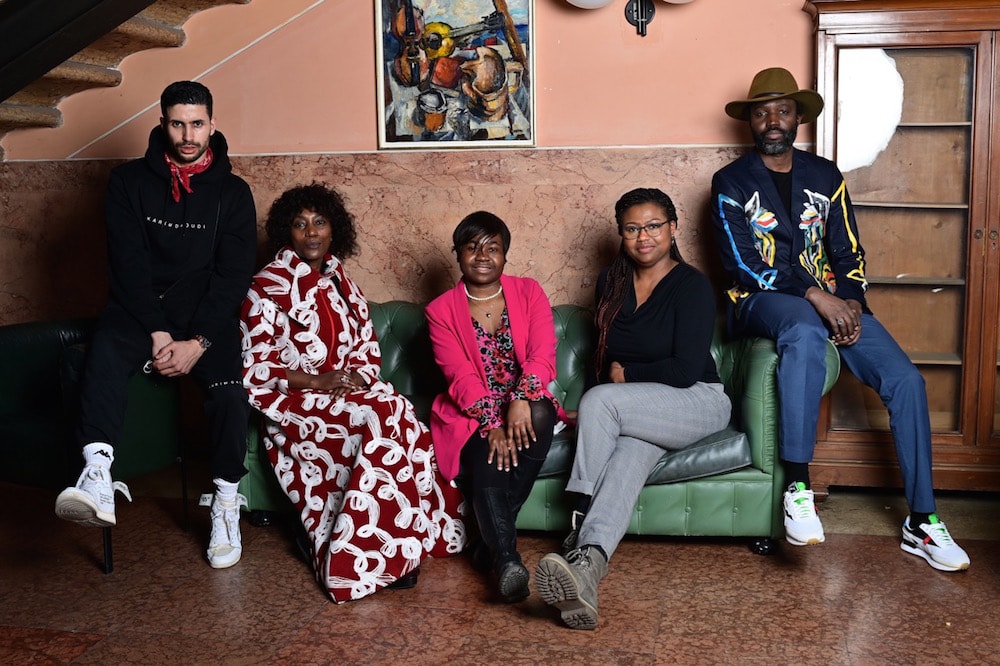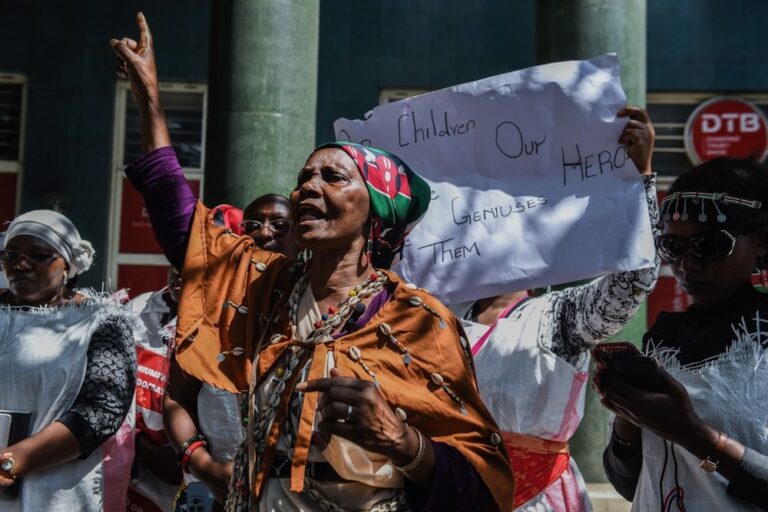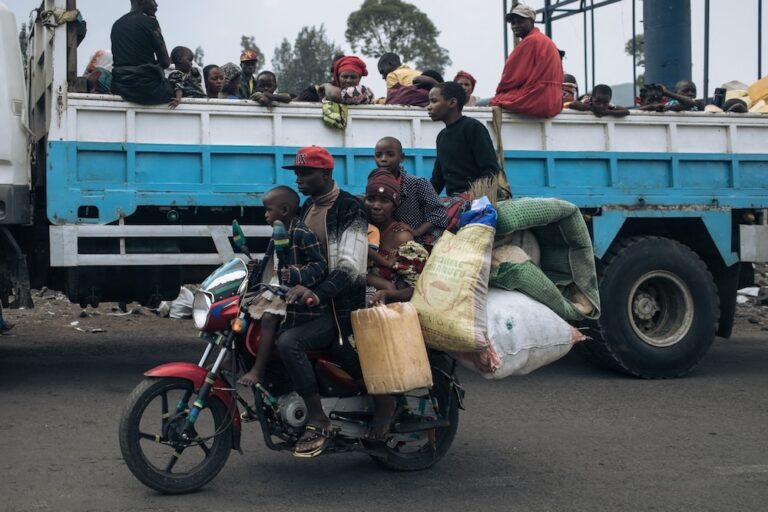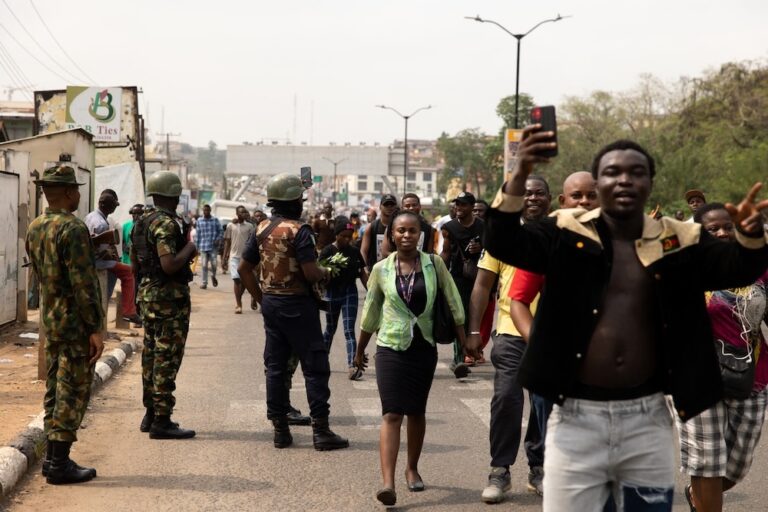February 2021 in Africa: A free expression roundup produced by IFEX’s regional editor Reyhana Masters, based on IFEX member reports and news from the region. An audio discussion relating to this piece is available here.
February – a month dedicated to romance and declarations of love in many cultures – was peppered with more setbacks than triumphs. While continental creative advocacy went global and Angola repealed the criminalisation of homosexuality, homophobia rose up the ranks in Ghana, intimate partner violence took centre stage, Nigerian journalists were kidnapped for ransom and a British journalist was expelled from Mozambique.
Black Lives Matter inspires African designs
In a demonstration of how free expression can be creatively wielded to advocate for social justice issues, Italian designers of African origin launched a digital runway show to advocate for Black Lives Matter.
Dubbed the ‘Fab Five,’ Joy Meribe, Fabiola Manirakiza, Gisele Claudia, Pape Macodou Fall and Karim Daoudi made their runway debuts during the global opening of Milan Fashion Week, with their BLM-inspired designs.
Their inclusion in this global event – a historical and unique moment – was in response to a letter in which Haitian-born Italian, Stella Jean, the only black member of the Italian Fashion Chamber, posed the question: “Do #BLM in Italian Fashion?”
According toThe Star: “Jean is also working on a database of African artisanal techniques, fabrics, motifs and other cultural references. The Italian-Haitian designer sees the move as a bulwark against cultural appropriation that does not economically benefit Africans and a way to prevent racist gaffes.”
#DemLoot goes viral
Zimbabwean activist and journalist Hopewell Chino’no’s remix version of #DemLoot has gone viral across the continent as a song and dance challenge. The lyrics resonate not only with Zimbabweans, but with citizens of many other countries, all frustrated by similar issues of unemployment, rampant corruption, and poor social service delivery.
“Lord have mercy, mercy, mercy;
hospitals no medication,
dem loot;
ghetto youths no jobs,
dem loot;
no water to drink in townships,
dem loot.”
While not novel, the contextualisation of political struggles through music and song is becoming a popular way to reach out and connect to younger activists and prospective constituents.
Fela Kuti nominated to rock n’ roll hall of fame
Nigerian musical genius and legend Fela Kuti, who was celebrated in his home country as a political force, a cultural rebel, and the voice of Nigeria’s have-nots, has been posthumously nominated for induction into the Rock and Roll Hall of Fame.
Kuti, who died more than two decades ago, was sent to England to study medicine and instead, as described by Vice: “created the musical genre Afrobeat, a synergy of influences from his upbringing in Nigeria, where he was raised on church music, and the jazz, funk and soul he heard after moving to London and the USA.”
Radicalised by his interaction with the revolutionary Black Panthers while studying in the US, Kuti came back home and crafted lyrics criticising and conveying his disapproval of militarised rule. His constant clashes with authorities resulted in numerous arrests, and subsequently the loss of his mother, when she sustained injuries during a military raid on the musician’s compound. His message of resistance lives on through his son Femi Kuti and grandson Made Kuti, who recently released a joint double album titled Legacy+.
Fela Kuti is the only African artist among the 16 musicians nominated for induction into the Rock and Roll Hall of Fame in 2021. News on his selection will only be known in May, when the final five successful nominees are announced.
Homophobia to be a punishable offence in Angola
A momentous win for Angolans and the continent was the abolishment of the 133-year-old ‘vices against nature’ penal code criminalising homosexuality.
In January 2019, the Angolan National Assembly’s historical vote of 155 to 1 had facilitated the introduction of a new penal code which no longer criminalised same-sex relationships. However, President João Lourenço only signed the new penal code into law in November of last year. It officially came into effect on 10 February 2021.
The government went a step further by including Article 214 (1) in the new Penal Code, which makes discrimination against people on the basis of their sexual orientation an offence punishable with a sentence of up to two years in prison.
LGBTQI+ community centre shut down in Ghana
Meanwhile, homophobic sentiment driven by politicians and religious groups peaked in Ghana, just before a newly-opened community centre for the LGBTQI+ community was raided and forcibly closed.
The closure of LGBTQI+ Rights Ghana came on the heels of Ghanaian journalist Ignatius Annor’s bold announcement : “This is going to be the very first time that I am using your medium to say that not only am I an activist for the rights of Africa’s sexual minorities, what you will call the LGBT+ community, but I am gay.”
The JoyNews discussion included a conversation on the work of LGBTQI+ rights and the counselling and paralegal services and workshops offered at the community centre.
A group of over 100 Ghanaian feminists announced their solidarity with the centre and queer and transgender Ghanaians everywhere, and in their strongly-worded statement said: “We align our political perspective with a radical vision of freedom and justice for all people in Ghana, which is also enshrined in our Constitution.”
Reporting on Tigray is risky business
Freelance Ethiopian journalist Lucy Kassa was physically attacked and threatened in her home. Her unknown attackers intimated that the attack was linked to her coverage of the conflict between Ethiopia’s federal government and local authorities in the northern Tigray region.
Kassa was knocked to the ground and warned that next time she would be hit harder. Her computer, a USB flashstick, and photos she had collected in the course of reporting one of her stories were taken by the attackers.
Threats against journalists reporting on the Tigray conflict come amidst reports by Amnesty International (AI), Human Rights Watch (HRW), and other organisations of mass killings, torture, and rape.
A report by AI states that “the numerous reports of Eritrean troops killing hundreds of unarmed civilians in the northern city of Axum on 28-29 November 2020, opening fire in the streets and conducting house-to-house raids in a massacre, may amount to a crime against humanity”.
HRW reports confirm the indiscriminate shelling of urban areas in Tigray by Ethiopian federal forces and the artillery attacks on hospitals, schools, and markets in the city of Mekelle, and the towns of Humera and Shire, all of which are in violation of the laws of war.
Adding her voice to the issue, UN High Commissioner for Human Rights (UNHCR) Michelle Bachelet said: “without prompt, impartial and transparent investigations and holding those responsible accountable, I fear violations will continue to be committed with impunity, and the situation will remain volatile for a long time to come.”
#EndSARS protestors’ bank accounts unfrozen
Following a successful petition by 16 citizens who had their accounts frozen, the Central Bank of Nigeria was ordered to unfreeze the accounts of #EndSARS protestors by a Federal High Court in Abuja. The freeze on bank accounts was one of several measures used to suppress the protests calling for an end to police brutality and the disbandment of an abusive police unit known as the Special Anti-Robbery Squad (SARS).
The bank accounts were arbitrarily frozen without any prior notice or legal proceedings, which, HRW points out: “indicates a wider problem of impunity which threaten citizens’ rights” and that “an investigation into the decision to freeze the accounts should be carried out and any officials found responsible for abusing power and infringing due process should be held accountable.”
Governments target social media sites
African governments have added to their growing list of tactics in dealing with social media platforms, by issuing directives to telecommunications companies to block access to targeted sites.
In Nigeria, access to popular newsite People’s Gazette was blocked on four major mobile internet providers – a move confirmed by digital rights group Quirium, who were able to identify the numerous strategies deployed in blocking the site.
The Ghana Business News website was temporarily taken offline by its webhost, following complaints that the site had breached American copyright laws. The complainants falsely claimed the Ghana-based website had republished a piece featured in Kenya’s Daily Nation without seeking permission. The website was back online after the authors of the article confirmed they had in fact given Emmanuel Dogbevi, Managing Editor of Ghana Business News, permission to republish it.
Spotlight on Gender-Based Violence
Just three days before Valentine’s Day, the issue of gender-based violence took centre stage in South Africa, when news of broadcaster Dimakatso Ratselane being rushed to hospital after being savagely stabbed multiple times, broke out. The Commission for Gender Equality condemned the brutal attack on Ratselane and reiterated its commitment to raising awareness of and advocating against GBV.
The event has brought national attention back to the issue of GBV, which was acknowledged by President Ramaphosa as a human rights issue during the February 2021 launch of the first-ever private-sector-led GBV and femicide fund.
The alarming spike in intimate partner violence and protests through 2019 led to President Ramaphosa introducing legislative amendments to push for “minimum sentencing in cases of gender-based violence, bail conditions for suspects, and greater protection for women who are victims of intimate partner violence.” During the first week of South Africa’s full lockdown in March 2020, calls and SMS messages to the country’s gender-based violence command centre doubled, and data-free messages increased tenfold.
In Brief
British journalist Tom Bowker was deported from Mozambique and banned from returning for 10 years. Bowker believes this forced departure from a country he called home for the past six years was politically motivated. As the co-founder of online publication Zitamar News, Bowker reported extensively on the unrest in resource-rich Cabo Delgado. In the lead-up to his expulsion, his accreditation had been revoked.
Cabo Delgado is the same province where community radio journalist Ibraimo Mbaruco disappeared on 7 April 2020. Mbaruco’s last message before he was taken was: ‘I have been surrounded by the military’. In 2018, journalists Amade Abubacar and Germano Daniela Adriano were arrested and detained for more than three months.
In Nigeria, IFEX members the International Press Centre (IPC) and Media Rights Agenda )MRA) have described the kidnappings of Punch newspaper reporter Okechukwu Nnodim from his house in Abuja and Nigeria Television Authority reporter Adichiebere Onyia in Port Harcourt while on her way home, as a dangerous trend. Nnodim was freed a few days after being captured, while Onyia was released on Valentine’s Day. The Nigeria Union of Journalists, IPC and MRA called on police to apprehend the kidnappers.
A protestor who was part of a group railing against South Africa’s lockdown regulations was charged with assaulting eNCA journalist Monique Mortlock, for forcefully demasking her. Craig Peiser, the head of We Are More movement, was arrested, but later released after the court ruled him unfit to stand trial. Peiser, who was admitted to a psychiatric hospital, apologised to Mortlock.
The Liberian government threatened to revoke the license of private radio station D-15FM if it continued airing the “Costa Show”, hosted by self-exiled government critic Henry P. Costa. Authorities believe Costa should not be interacting with Liberian audiences because he is a fugitive who fled to America. IFEX member the Center for Media Studies & Peace Building (CEMESP) criticised the government’s attempt to clamp down on the media and freedom of expression, saying the warning violated rights guaranteed in the country’s constitution.
Raymond Malonga, sixty-year-old cartoonist and editor of satirical newspaper Sel-Piment, was arrested in a hospital in the Republic of Congo where he was being treated for malaria. He was then taken to Brazzaville’s main prison and dumped in the section for COVID-19 inmates. Malonga was arrested for publishing a story in Sel-Piment alleging that the wife of a government official in the Congo had embezzled funds.
Media Rights Agenda has demanded Nigeria’s Inspector General of Police (IGP) investigate the brutal attack on Precious Nwadike, editor of the Owerri-based newspaper Community Watchdog.
If you enjoyed reading this piece, check out the related episode of Africa Brief, our monthly audio discussion with IFEX Regional Editor Reyhana Masters about some of the key issues impacting Africa’s free expression landscape. We recorded this episode on Wednesday 10 March:



